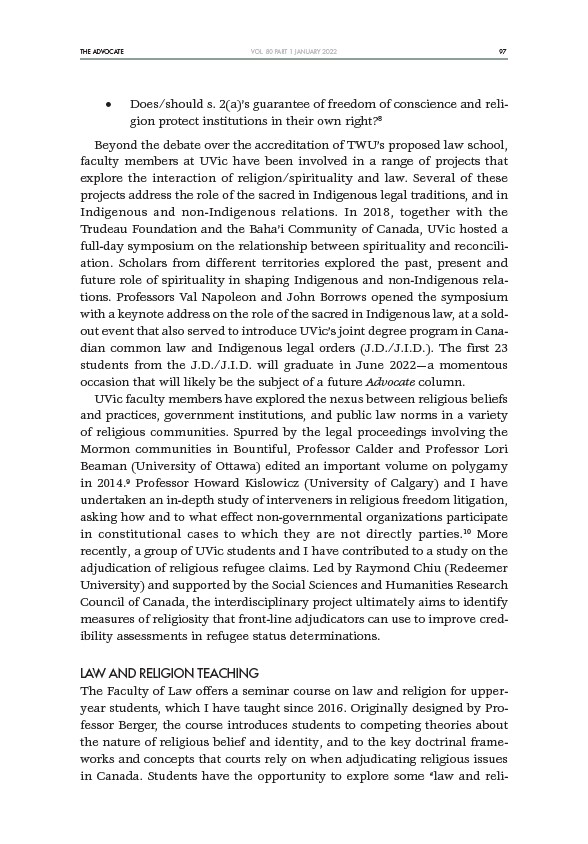
THE ADVOCATE 97
VOL. 80 PART 1 JANUARY 2022
• Does/should s. 2(a)’s guarantee of freedom of conscience and religion
protect institutions in their own right?8
Beyond the debate over the accreditation of TWU’s proposed law school,
faculty members at UVic have been involved in a range of projects that
explore the interaction of religion/spirituality and law. Several of these
projects address the role of the sacred in Indigenous legal traditions, and in
Indigenous and non-Indigenous relations. In 2018, together with the
Trudeau Foundation and the Baha’i Community of Canada, UVic hosted a
full-day symposium on the relationship between spirituality and reconciliation.
Scholars from different territories explored the past, present and
future role of spirituality in shaping Indigenous and non-Indigenous relations.
Professors Val Napoleon and John Borrows opened the symposium
with a keynote address on the role of the sacred in Indigenous law, at a soldout
event that also served to introduce UVic’s joint degree program in Canadian
common law and Indigenous legal orders (J.D./J.I.D.). The first 23
students from the J.D./J.I.D. will graduate in June 2022—a momentous
occasion that will likely be the subject of a future Advocate column.
UVic faculty members have explored the nexus between religious beliefs
and practices, government institutions, and public law norms in a variety
of religious communities. Spurred by the legal proceedings involving the
Mormon communities in Bountiful, Professor Calder and Professor Lori
Beaman (University of Ottawa) edited an important volume on polygamy
in 2014.9 Professor Howard Kislowicz (University of Calgary) and I have
undertaken an in-depth study of interveners in religious freedom litigation,
asking how and to what effect non-governmental organizations participate
in constitutional cases to which they are not directly parties.10 More
recently, a group of UVic students and I have contributed to a study on the
adjudication of religious refugee claims. Led by Raymond Chiu (Redeemer
University) and supported by the Social Sciences and Humanities Research
Council of Canada, the interdisciplinary project ultimately aims to identify
measures of religiosity that front-line adjudicators can use to improve credibility
assessments in refugee status determinations.
LAW AND RELIGION TEACHING
The Faculty of Law offers a seminar course on law and religion for upperyear
students, which I have taught since 2016. Originally designed by Professor
Berger, the course introduces students to competing theories about
the nature of religious belief and identity, and to the key doctrinal frameworks
and concepts that courts rely on when adjudicating religious issues
in Canada. Students have the opportunity to explore some “law and reli-